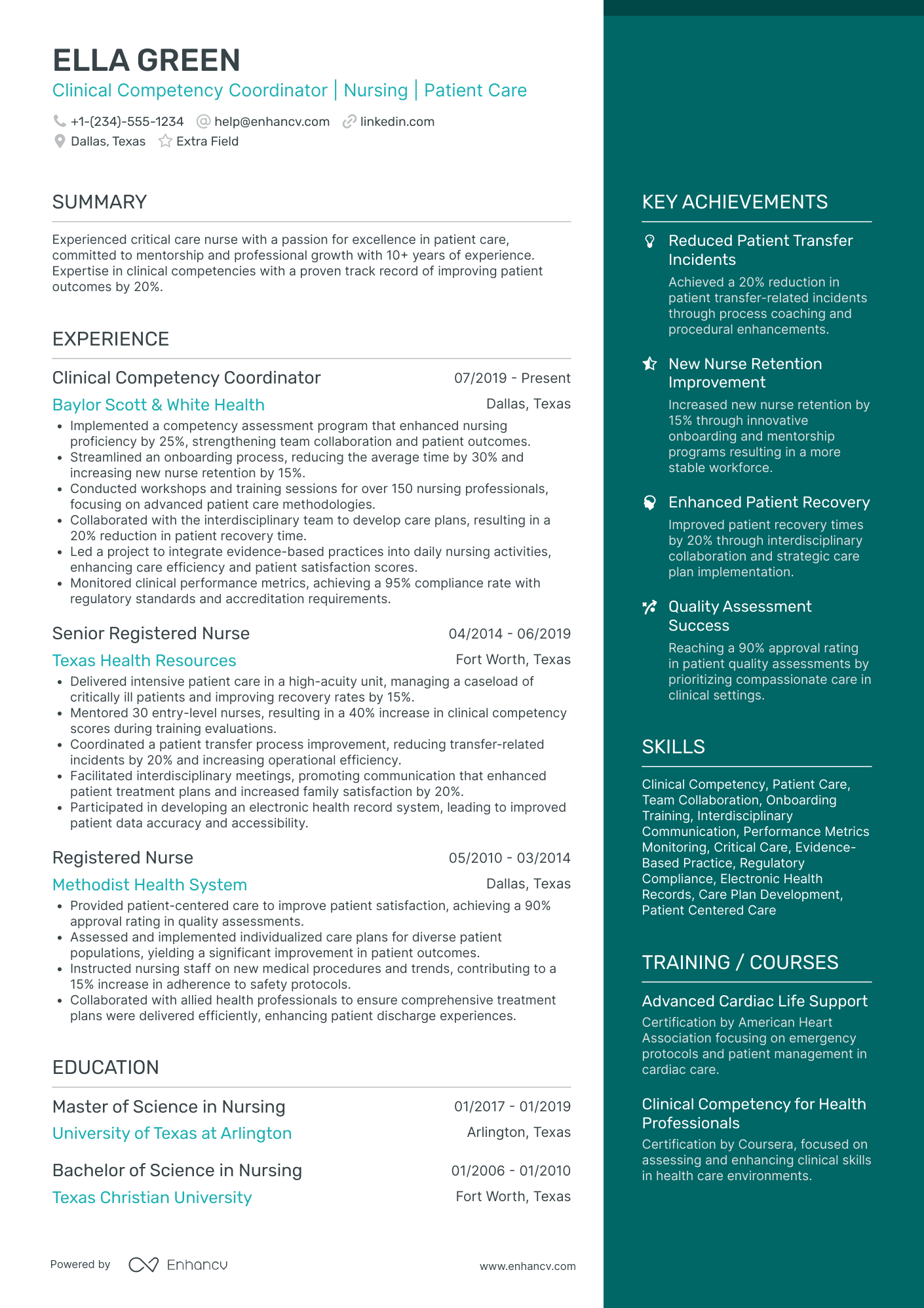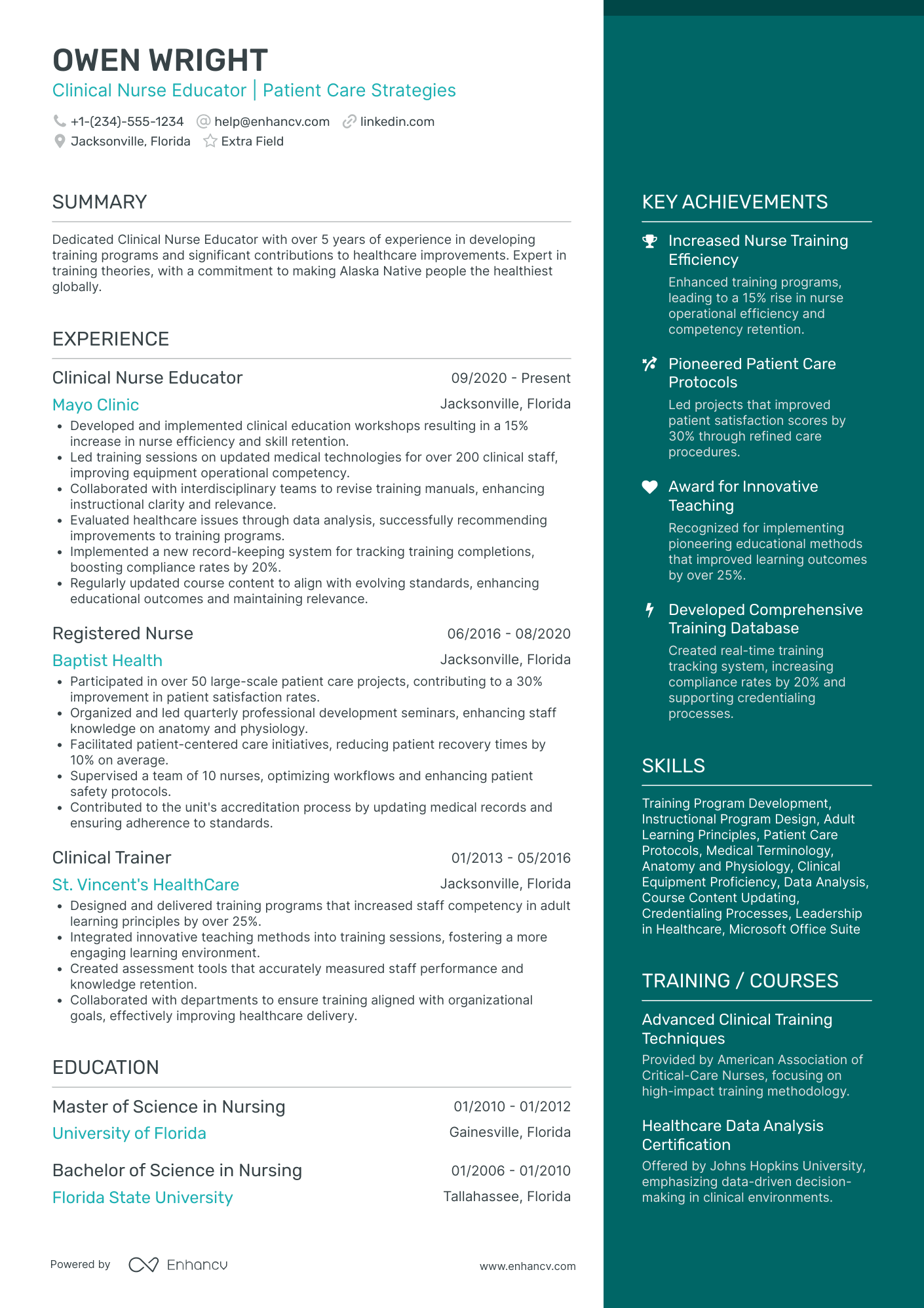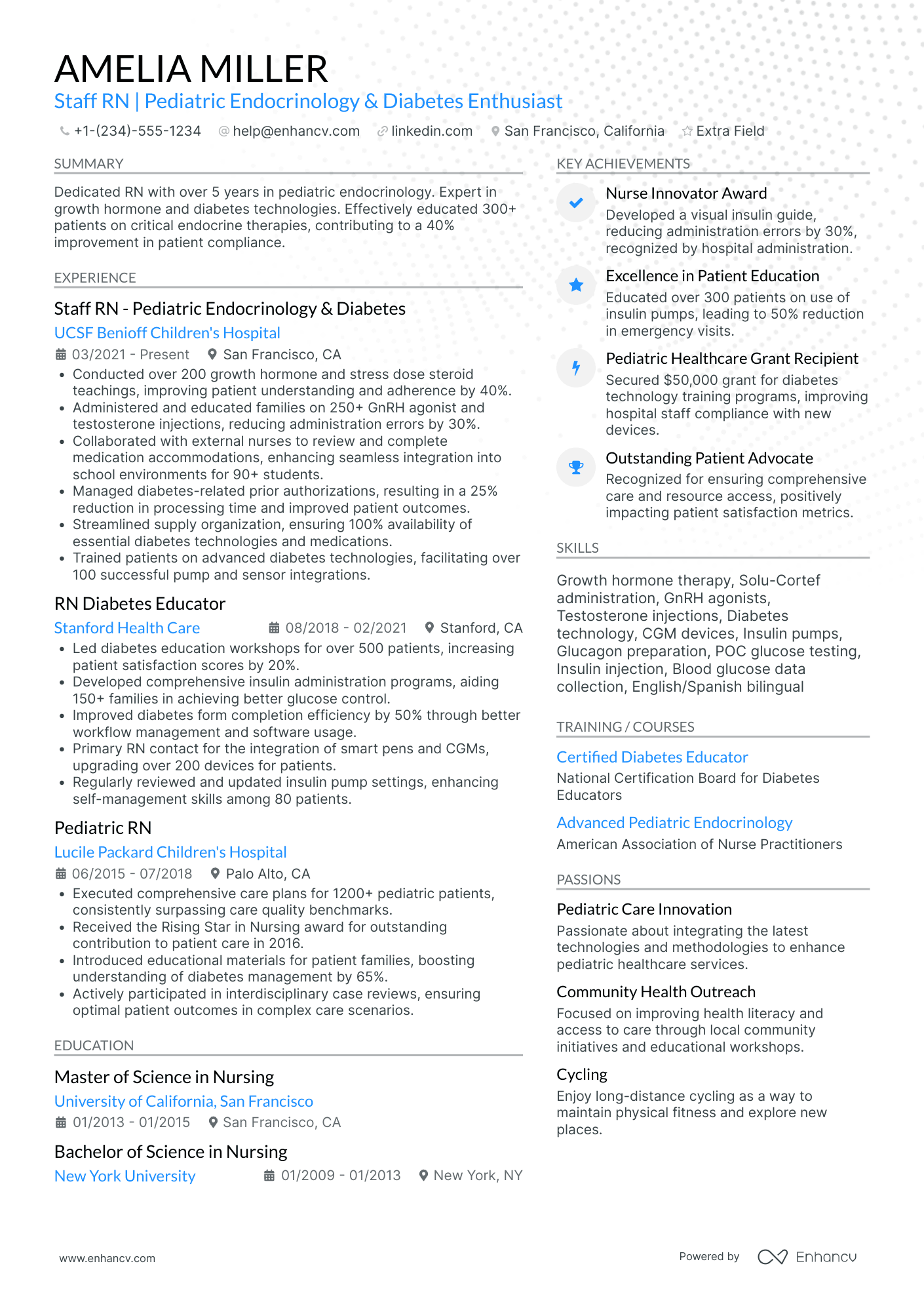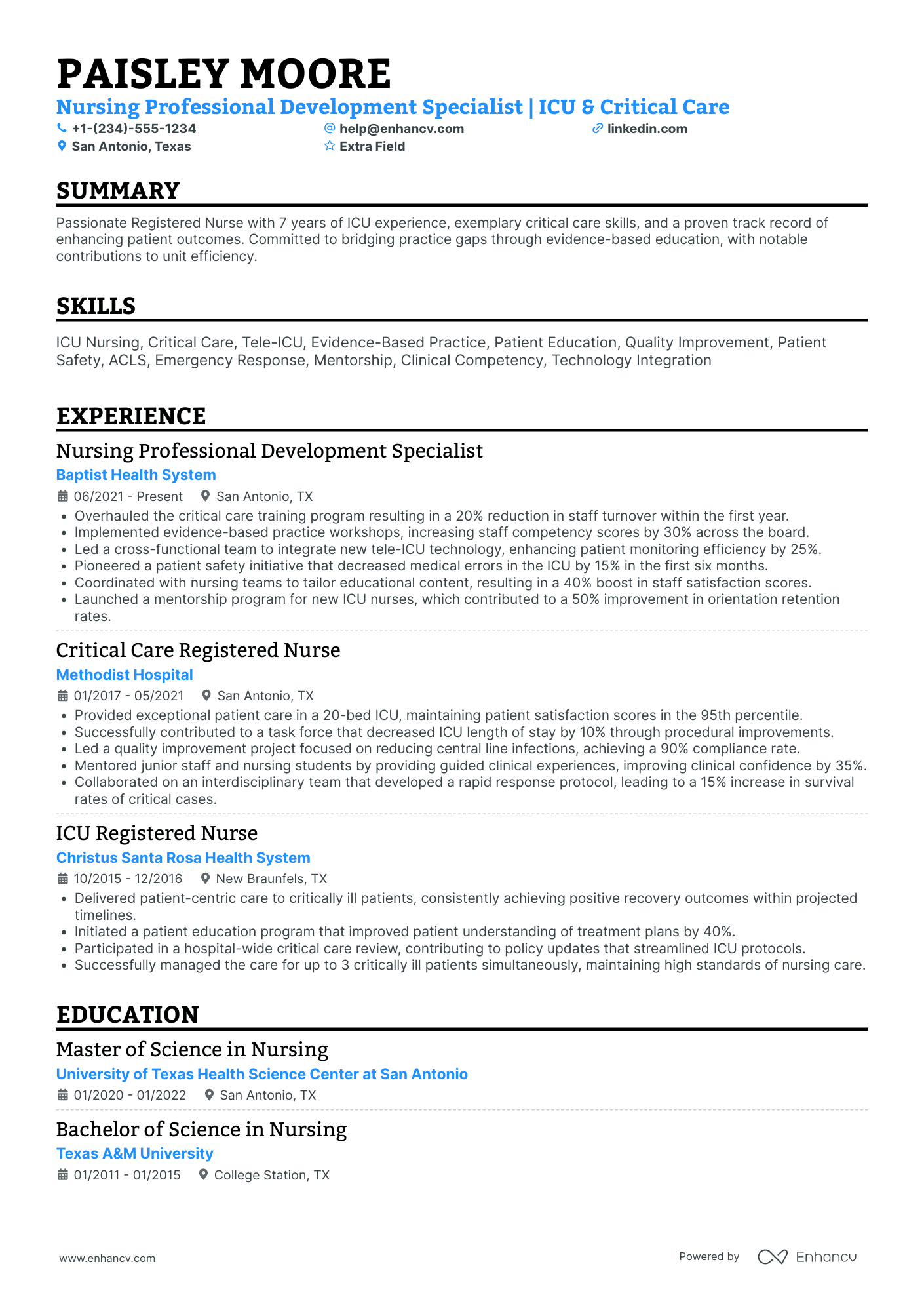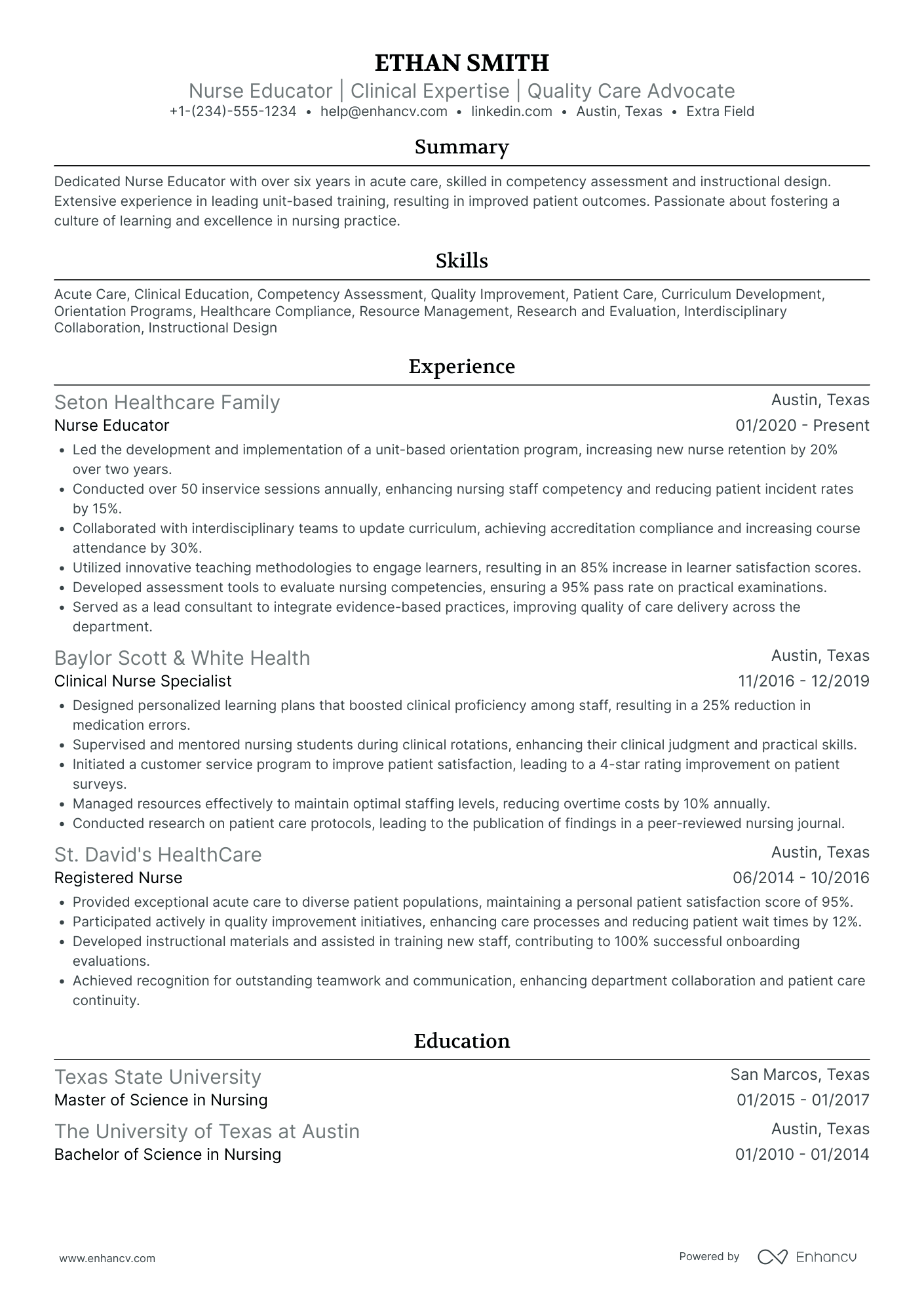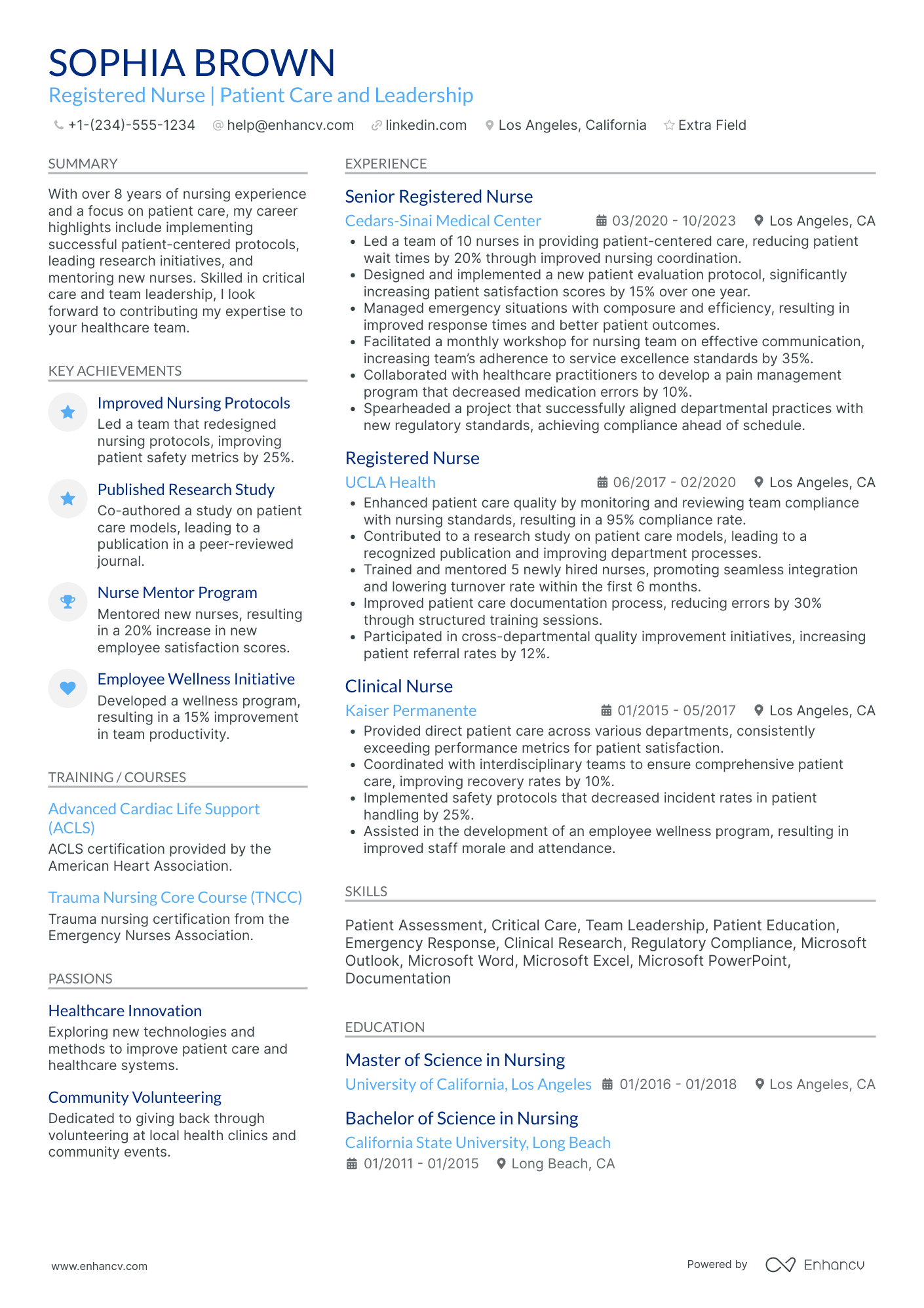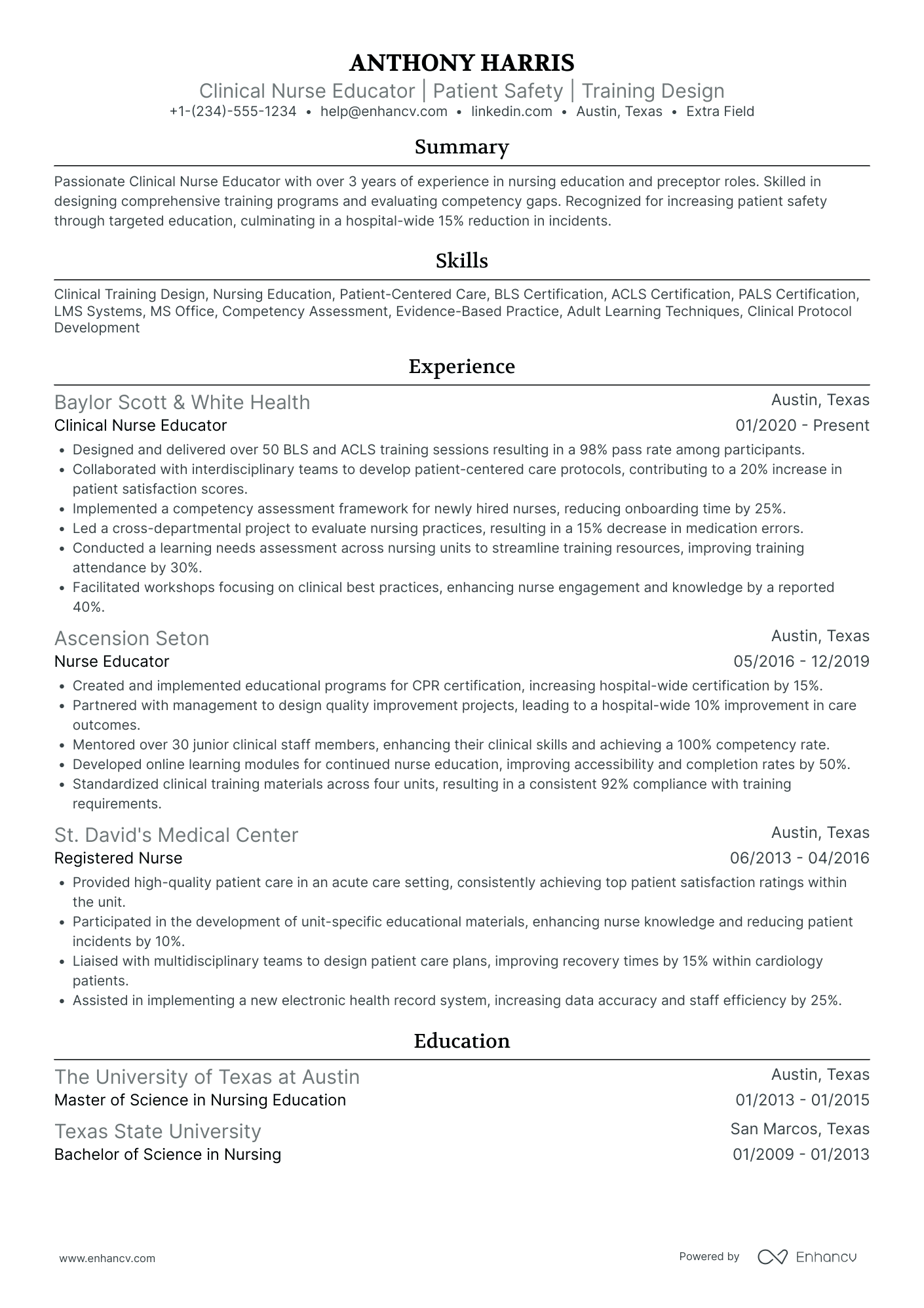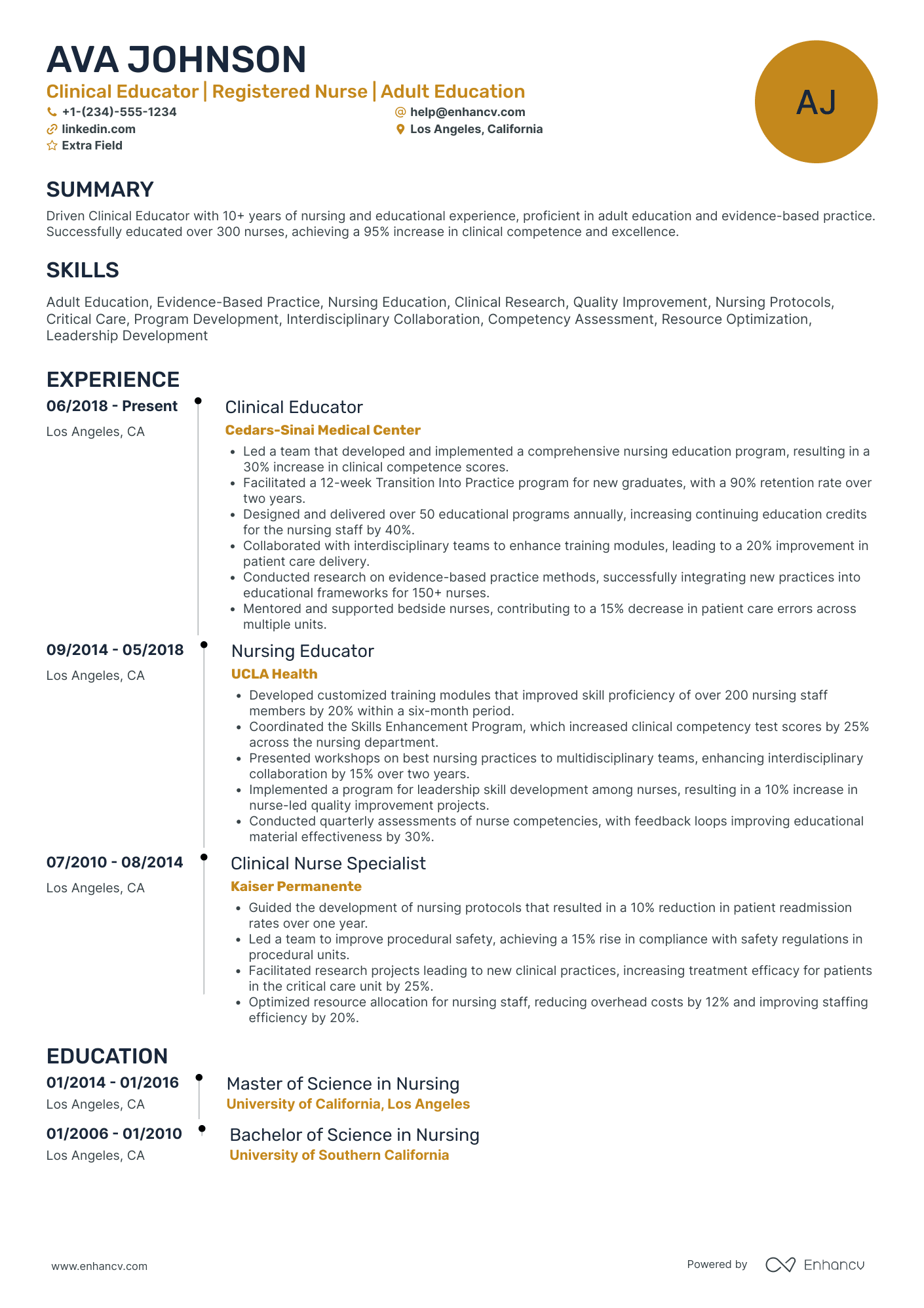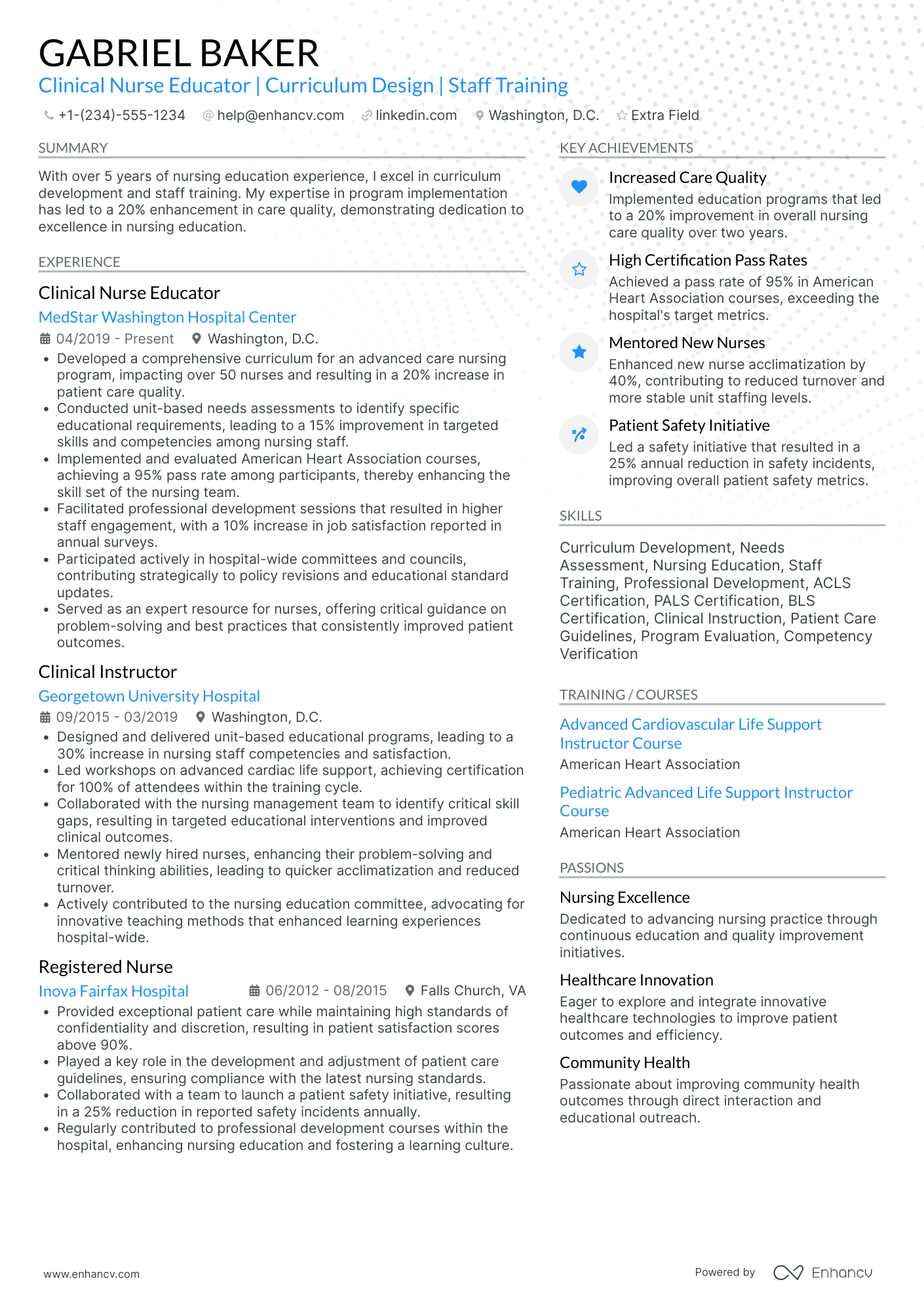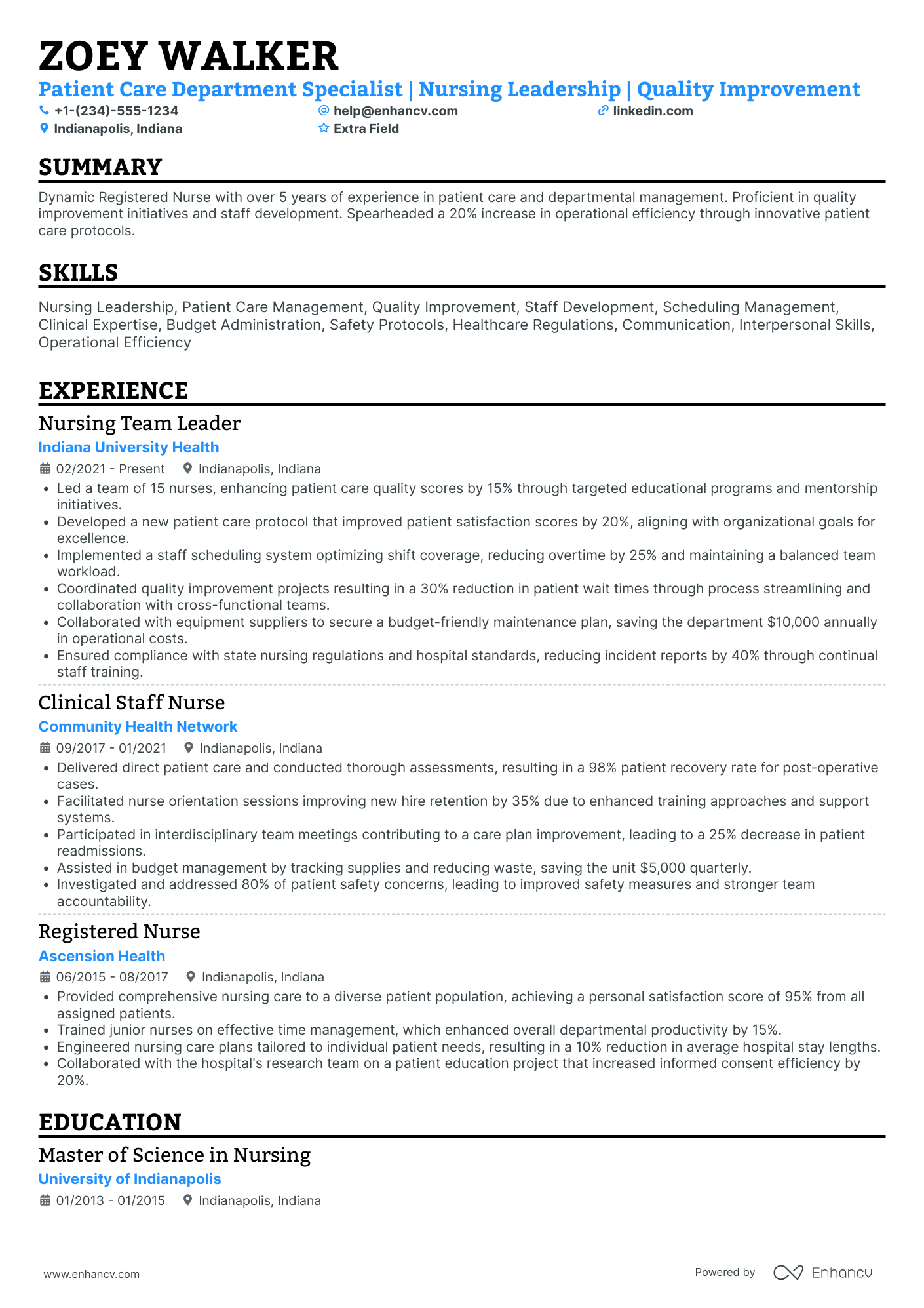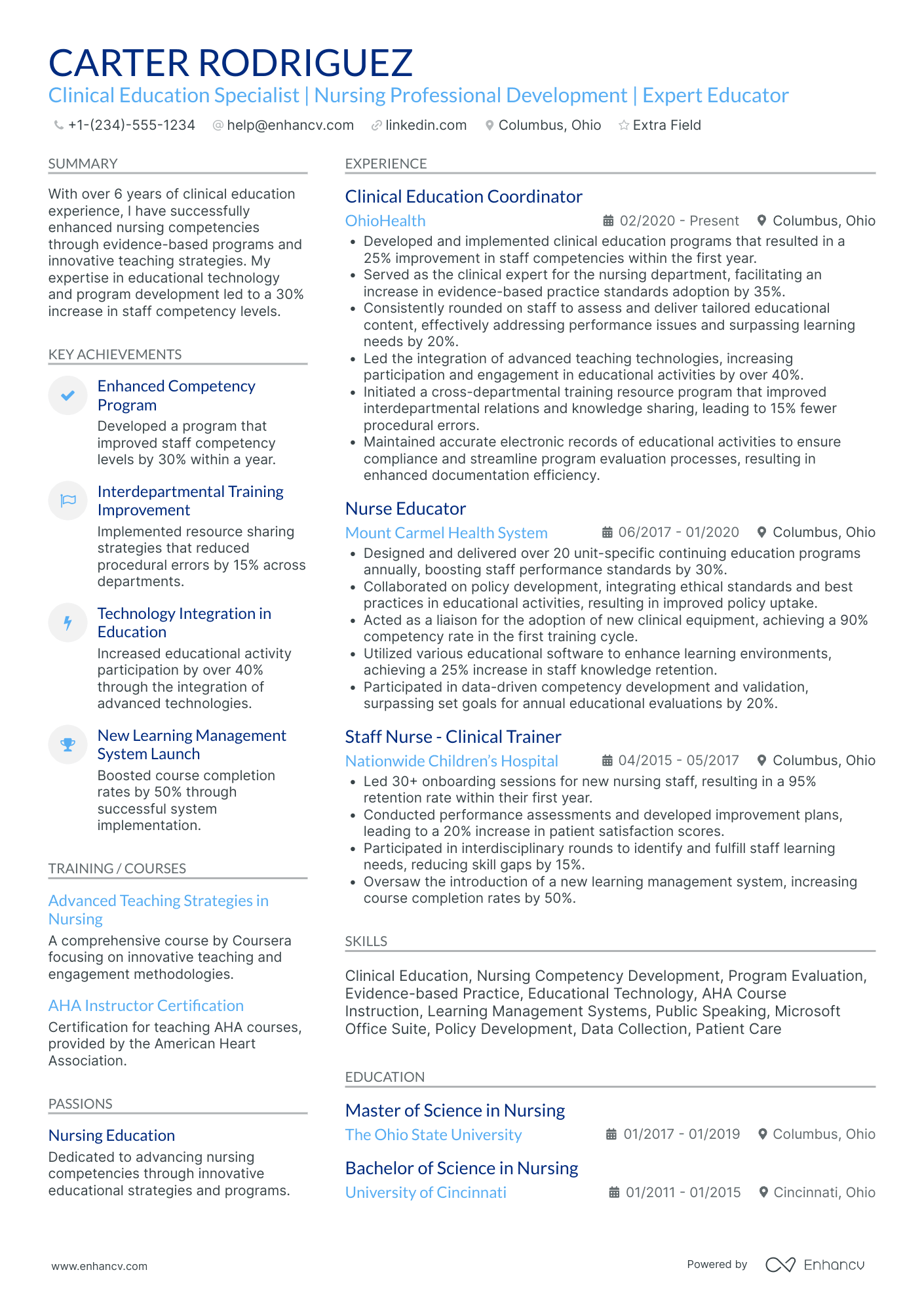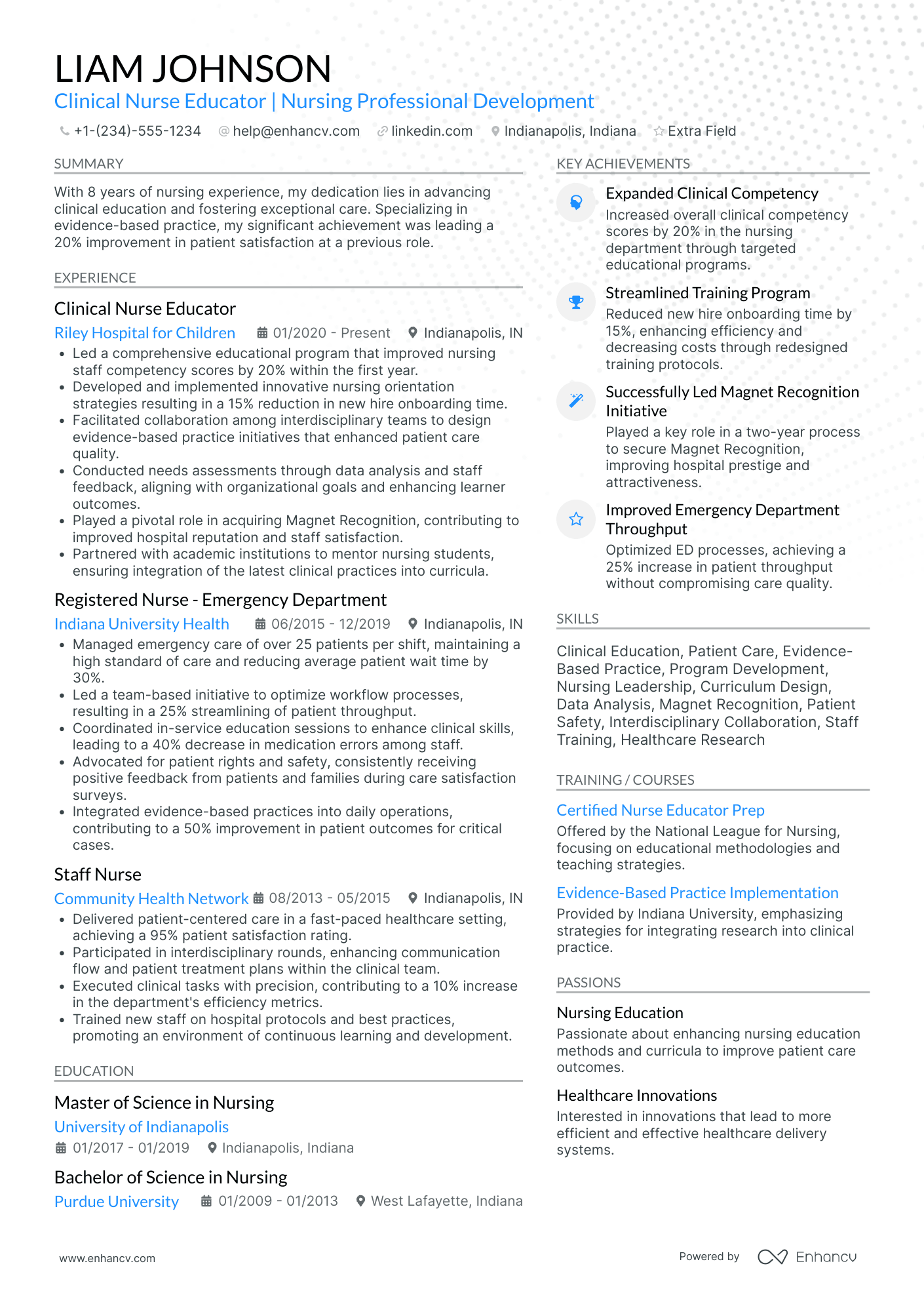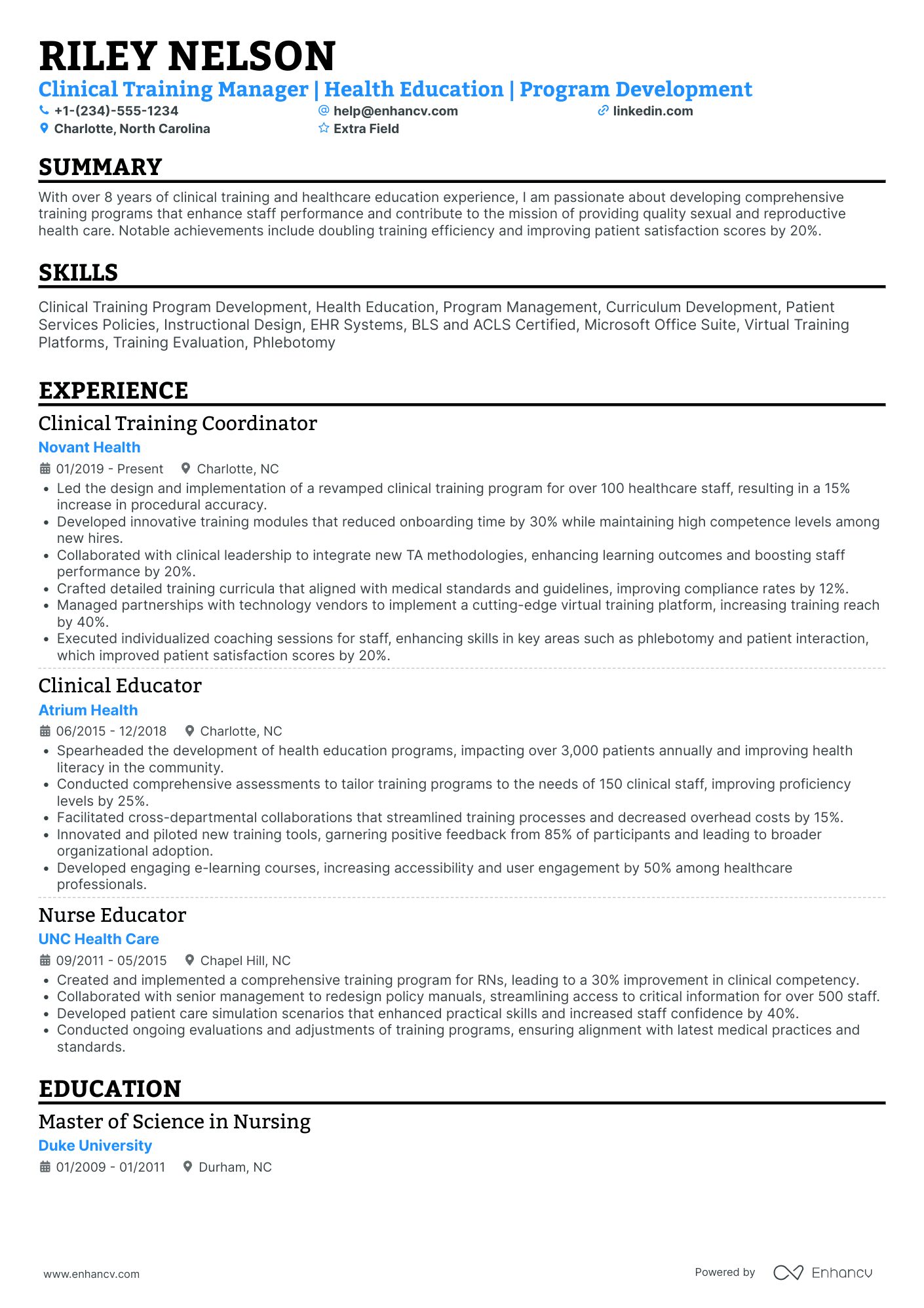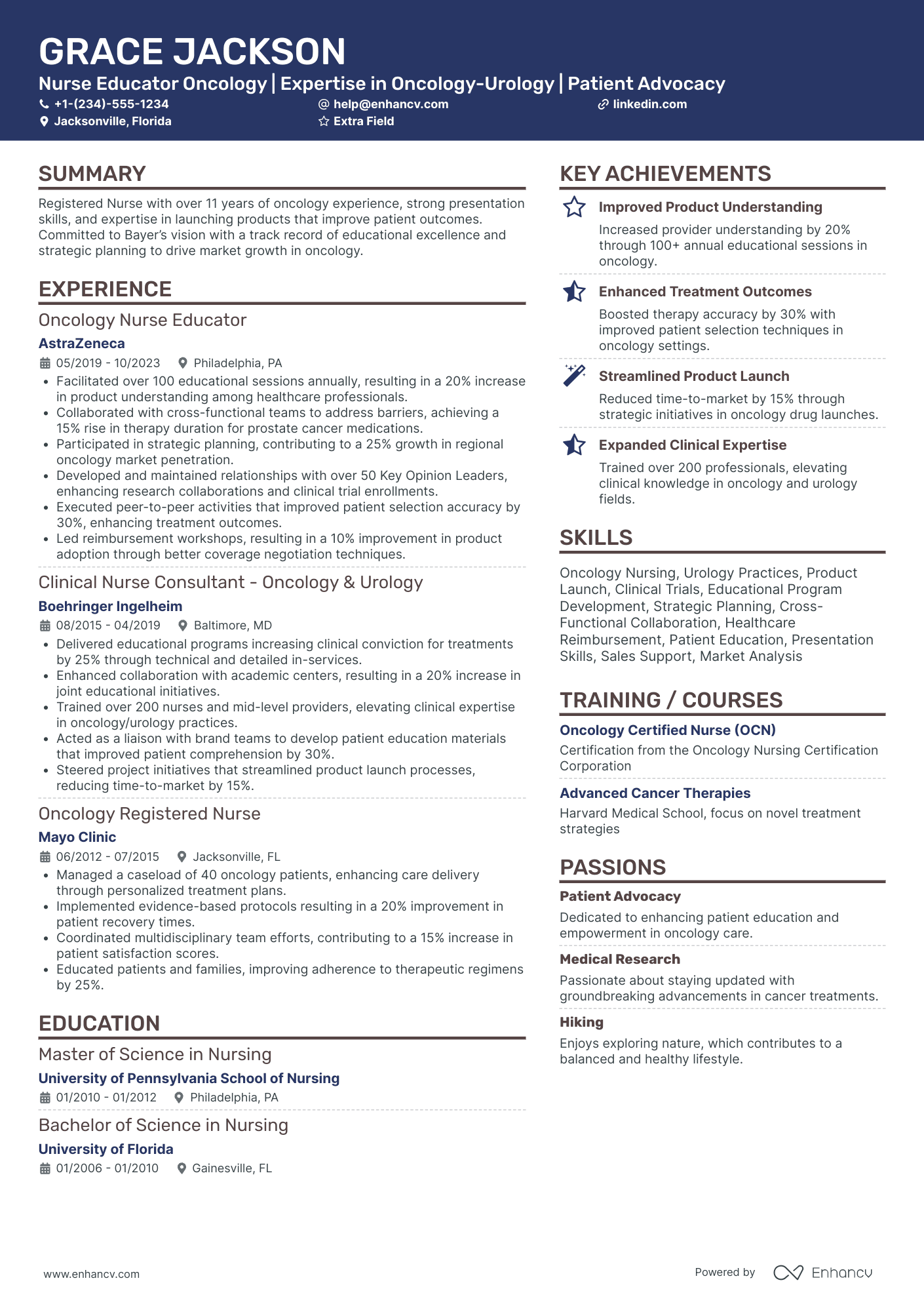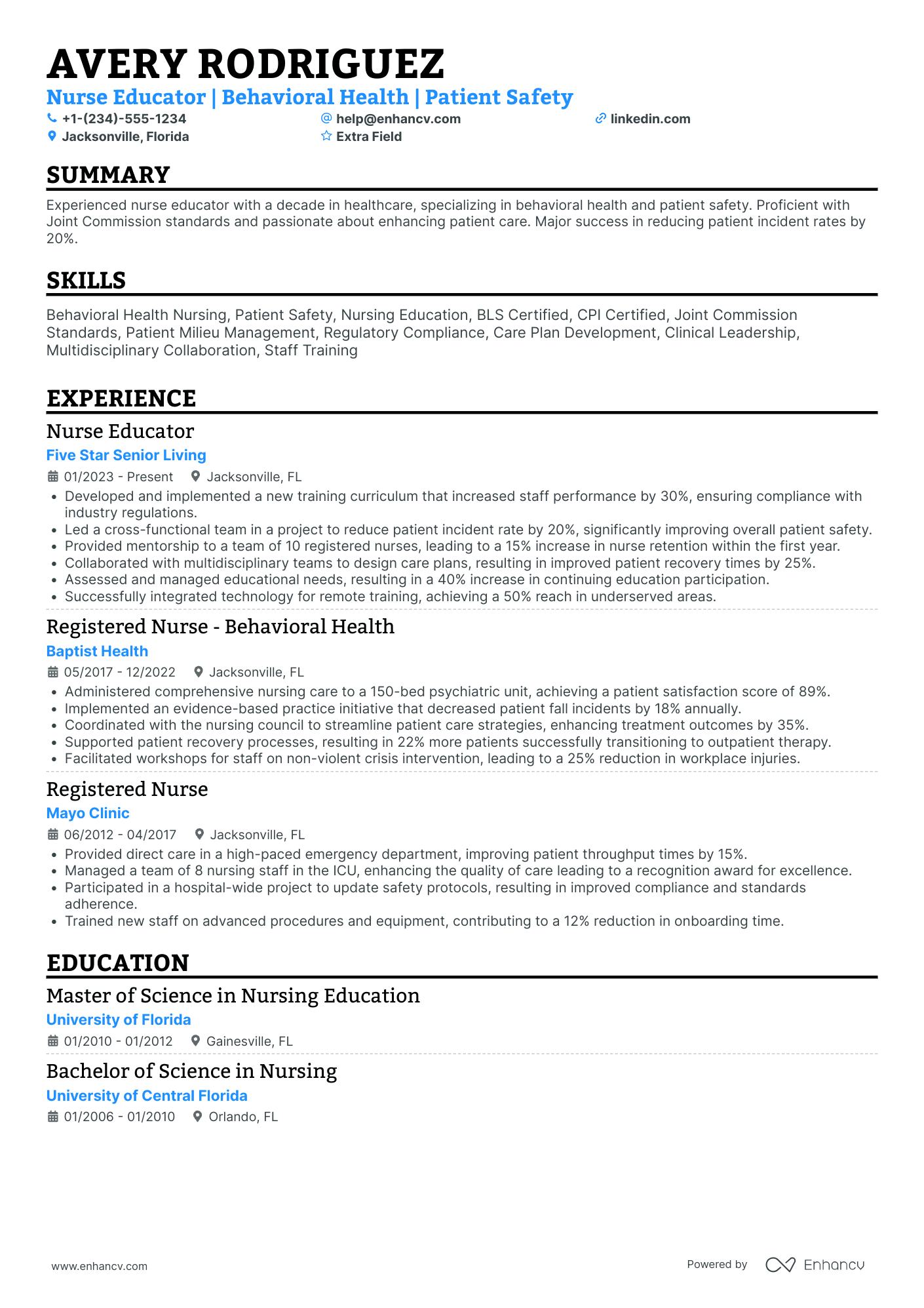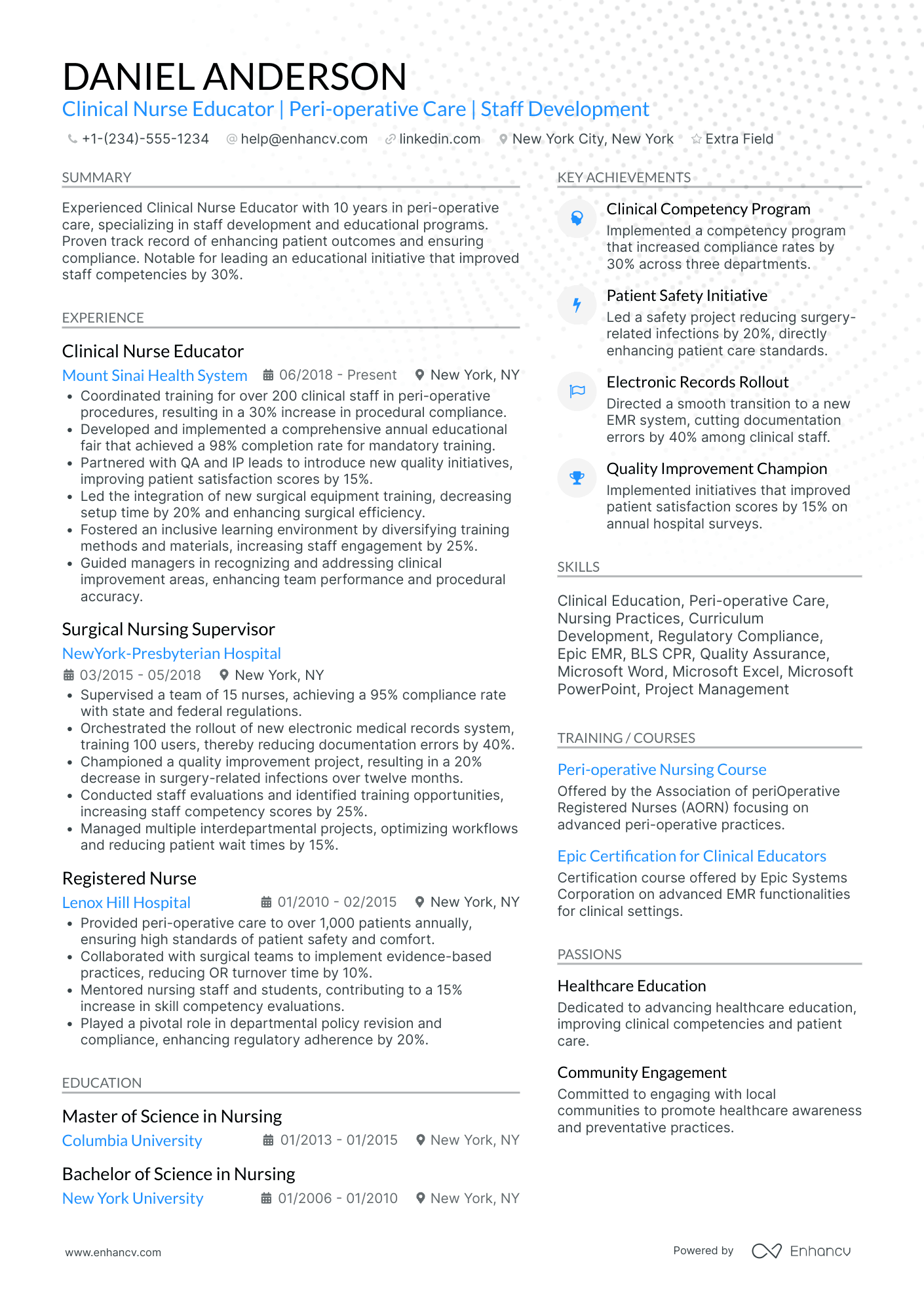Many nurse educator resumes fail because they read like job descriptions, so ATS screening misses key skills and recruiters can't spot impact fast. In today's crowded hiring process, that costs interviews within seconds.
A strong resume shows what changed because of your work, not just what you taught. Understanding how to make your resume stand out means you'll highlight reduced onboarding time, higher competency pass rates, improved patient safety metrics, stronger survey scores, and system-wide adoption of updated protocols.
Key takeaways
- Quantify teaching outcomes like pass rates, onboarding time, and retention to prove impact.
- Use reverse-chronological format for experienced educators and hybrid format for career switchers.
- Tailor every experience bullet to match the specific job posting's language and priorities.
- Demonstrate skills through measurable achievements in your summary and experience sections, not just lists.
- Include certifications like CNE or CHSE near your education to reinforce teaching credentials.
- Use AI to refine language and alignment, but stop before it invents or inflates your experience.
- Build your resume faster with Enhancv to keep formatting clean and bullets results-driven.
Job market snapshot for nurse educators
We analyzed 354 recent nurse educator job ads across major US job boards. These numbers help you understand salary landscape, employer expectations, career growth patterns at a glance.
What level of experience employers are looking for nurse educators
| Years of Experience | Percentage found in job ads |
|---|---|
| 1–2 years | 15.8% (56) |
| 3–4 years | 11.6% (41) |
| 5–6 years | 13.3% (47) |
| 10+ years | 0.3% (1) |
| Not specified | 58.5% (207) |
Nurse educator ads by area of specialization (industry)
| Industry (Area) | Percentage found in job ads |
|---|---|
| Healthcare | 76.6% (271) |
| Finance & Banking | 11.3% (40) |
| Education | 6.5% (23) |
| Government | 5.6% (20) |
Top companies hiring nurse educators
| Company | Percentage found in job ads |
|---|---|
| Wolters Kluwer | 5.6% (20) |
| IQVIA Holdings Inc | 4.8% (17) |
| Department of Veterans Affairs | 4.5% (16) |
| PruittHealth | 4.2% (15) |
| HCA | 3.4% (12) |
| Universal Health Services | 2.8% (10) |
| University of Chicago Medical Center | 2.8% (10) |
Role overview stats
These tables show the most common responsibilities and employment types for nurse educator roles. Use them to align your resume with what employers expect and to understand how the role is structured across the market.
Day-to-day activities and top responsibilities for a nurse educator
| Responsibility | Percentage found in job ads |
|---|---|
| Nursing | 24.9% (88) |
| Clinical education | 13.3% (47) |
| Bls | 11.9% (42) |
| Adult learning principles | 10.7% (38) |
| Powerpoint | 9.6% (34) |
| Patient care | 8.5% (30) |
| Acls | 8.2% (29) |
| Microsoft word | 8.2% (29) |
| Basic life support | 7.9% (28) |
| Rn license | 7.9% (28) |
| Excel | 7.3% (26) |
| Cpr | 6.8% (24) |
Type of employment (remote vs on-site vs hybrid)
| Employment type | Percentage found in job ads |
|---|---|
| On-site | 85.9% (304) |
| Hybrid | 13.0% (46) |
How to format a nurse educator resume
Recruiters evaluating nurse educator candidates prioritize clinical teaching experience, curriculum development skills, and evidence of student or program outcomes. Choosing the right resume format ensures these signals are immediately visible rather than buried under formatting that obscures your qualifications.
I have significant experience in this role—which format should I use?
Use a reverse-chronological format to present your deepest clinical education experience first and highlight career progression. Do:
- Lead with your most recent role and emphasize scope—number of students supervised, programs developed, or departments served.
- Feature role-specific expertise such as simulation lab instruction, NCLEX preparation curriculum, clinical competency assessment, and learning management systems like Canvas or Blackboard.
- Quantify outcomes tied to student performance, program accreditation, pass rates, or faculty development initiatives.
I'm junior or switching into this role—what format works best?
A hybrid format works best because it lets you lead with relevant teaching and clinical skills while still showing a concise work history. Do:
- Place a skills section near the top that highlights competencies like curriculum design, clinical precepting, student assessment, and evidence-based teaching strategies.
- Include practicum rotations, adjunct teaching roles, mentorship experience, or continuing education projects that demonstrate instructional ability.
- Connect every action to a measurable result so hiring committees can see your potential impact.
Why not use a functional resume?
A functional resume strips away the timeline and context that hiring committees need to verify where, when, and how you applied your teaching and clinical skills—making it harder to assess your readiness for an educator role.
- A functional format may be acceptable if you're a bedside nurse transitioning into education with no formal teaching titles, or if you have a significant resume gap, but only if you tie every listed skill to a specific project, clinical outcome, or instructional experience.
Once you've established a clean, readable format, the next step is deciding which sections to include and how to organize them for maximum impact.
What sections should go on a nurse educator resume
Recruiters expect a nurse educator resume to show clinical credibility, teaching effectiveness, and measurable improvements in staff performance and patient outcomes. Knowing what to put on a resume helps you prioritize the right information. Use this structure for maximum clarity:
- Header
- Summary
- Experience
- Skills
- Projects
- Education
- Certifications
- Optional sections: Publications, Research, Leadership
Your experience bullets should highlight measurable outcomes, program scope, learner impact, and results such as competency gains, compliance improvements, and quality or safety metrics.
Is your resume good enough?
Drop your resume here or choose a file. PDF & DOCX only. Max 2MB file size.
Once you’ve organized the key resume components to highlight your qualifications, focus next on writing your nurse educator experience section to show how you’ve applied them in practice.
How to write your nurse educator resume experience
The experience section is where you prove you've delivered meaningful results in nursing education—whether through curriculum design, clinical instruction, student mentorship, or program development using evidence-based teaching methods. Hiring managers prioritize demonstrated impact on learner outcomes, accreditation standards, and institutional goals over descriptive task lists. Writing a targeted resume ensures every bullet reflects what the employer actually needs.
Each entry should include:
- Job title
- Company and location (or remote)
- Dates of employment (month and year)
Three to five concise bullet points showing what you owned, how you executed, and what outcomes you delivered:
- Ownership scope: the nursing programs, curricula, clinical rotations, student cohorts, or simulation labs you were directly accountable for managing, developing, or improving.
- Execution approach: the pedagogical frameworks, learning management systems, simulation technologies, assessment tools, or evidence-based teaching strategies you applied to design instruction and evaluate competency.
- Value improved: changes to student pass rates, clinical competency benchmarks, program accreditation standing, curriculum relevance, learner retention, or patient safety education outcomes tied to your work.
- Collaboration context: how you partnered with clinical site coordinators, hospital leadership, interdisciplinary faculty, accreditation bodies, or preceptors to align educational programming with institutional and regulatory requirements.
- Impact delivered: outcomes framed as tangible results for learners, programs, or institutions—such as measurable gains in student preparedness, successful accreditation cycles, or expanded program capacity—rather than a list of activities performed.
Experience bullet formula
A nurse educator experience example
✅ Right example - modern, quantified, specific.
Nurse Educator (Clinical Education)
Riverside Medical Center | Columbus, OH
2022–Present
Four-hundred-bed acute care hospital delivering trauma, cardiac, and surgical services across five inpatient units.
- Designed and delivered competency-based onboarding for one hundred twenty new nurses using an LMS (Learning Management System), simulation lab scenarios, and skills checklists, cutting time-to-independent assignment by 18% and reducing first-ninety-day turnover by 9%.
- Built evidence-based sepsis and rapid response training aligned to American Heart Association guidelines, integrating Epic order sets and SBAR (Situation, Background, Assessment, Recommendation) workflows; improved protocol adherence from 76% to 91% and reduced sepsis bundle time-to-antibiotics by 14 minutes.
- Partnered with unit managers, infection prevention, and quality to launch central line-associated bloodstream infection prevention education using audit-and-feedback dashboards in Power BI; decreased central line-associated bloodstream infection rate by 22% over twelve months.
- Implemented quarterly high-fidelity simulation with interdisciplinary teams (nursing, respiratory therapy, pharmacy, and physicians), using TeamSTEPPS debriefs; increased code blue role clarity scores by 28% and improved post-event documentation completion to 97%.
- Standardized competency tracking and remediation in SharePoint and Microsoft Teams, automating reminders and report-outs for HR and nurse leaders; saved eight educator hours per week and raised on-time annual competency completion from 84% to 98%.
Now that you've seen how a strong experience section comes together, let's look at how to adjust yours to match the specific job you're targeting.
How to tailor your nurse educator resume experience
Recruiters evaluate nurse educator resumes through both human review and applicant tracking systems, so alignment with the job posting matters. Tailoring your resume to the job description ensures every bullet reflects what the hiring institution actually needs.
Ways to tailor your nurse educator experience:
- Mirror the exact clinical specialties and patient populations listed in the posting.
- Match simulation technologies or learning management systems the employer names.
- Use the same accreditation standards and nursing frameworks the job references.
- Reflect curriculum development methodologies described in the position requirements.
- Highlight competency assessment or student evaluation approaches the role prioritizes.
- Include evidence-based teaching strategies that align with stated program goals.
- Emphasize interprofessional collaboration models referenced in the job description.
- Incorporate clinical compliance or quality improvement language the employer uses.
Tailoring means aligning your real accomplishments with the role's stated requirements, not forcing keywords where they don't belong.
Resume tailoring examples for nurse educator
| Job description excerpt | Untailored | Tailored |
|---|---|---|
| Develop and evaluate nursing curricula using evidence-based teaching strategies and ACEN accreditation standards | Helped create course materials and taught nursing classes | Designed and revised BSN curricula aligned with ACEN accreditation standards, integrating evidence-based teaching strategies such as simulation-based learning and concept mapping across four clinical courses |
| Provide clinical instruction and mentorship to prelicensure nursing students in acute care settings, ensuring competency in patient safety and QSEN frameworks | Supervised students during their clinical rotations at the hospital | Provided direct clinical instruction to cohorts of 10 prelicensure BSN students in acute care units, mentoring competency development in patient safety practices and all six QSEN domains, with a 96% first-attempt NCLEX pass rate |
| Collaborate with interdisciplinary faculty to integrate high-fidelity simulation into the nursing program and assess student learning outcomes using standardized evaluation tools | Worked with other faculty on simulation lab activities | Partnered with interdisciplinary faculty to embed high-fidelity simulation scenarios into the adult health nursing sequence, using the Creighton Competency Evaluation Instrument to assess clinical judgment and document measurable improvements in student learning outcomes over three semesters |
Once you’ve aligned your experience with the role’s priorities, quantify your achievements to show the scope and impact of that work.
How to quantify your nurse educator achievements
Quantifying your achievements turns your teaching into proof of patient safety and operational impact. Focus on competency pass rates, onboarding time, compliance audit results, adverse event reductions, and staff retention after training changes.
Quantifying examples for nurse educator
| Metric | Example |
|---|---|
| Competency outcomes | "Raised annual skills fair pass rate from 82% to 95% across 210 nurses by adding simulation checkoffs and a standardized rubric in HealthStream." |
| Onboarding cycle time | "Cut new-hire orientation from eight to six weeks for med-surg RNs by redesigning the preceptor plan and weekly competency milestones." |
| Compliance readiness | "Improved Joint Commission documentation audit compliance from 88% to 97% in three months using chart review coaching and EHR tip sheets." |
| Safety risk reduction | "Reduced central line dressing change errors by 34% in one quarter after rolling out a bedside competency checklist and refresher microlearning." |
| Retention impact | "Improved six-month retention from 76% to 84% for 45 new graduate nurses by launching peer mentoring and targeted remediation sessions." |
Turn vague job duties into measurable, recruiter-ready resume bullets in seconds with Enhancv's Bullet Point Generator.
Once you've crafted strong bullet points for your experience section, you'll want to apply that same precision to presenting your hard and soft skills effectively.
How to list your hard and soft skills on a nurse educator resume
Your skills section shows how you design and deliver clinical education, and recruiters and an ATS (applicant tracking system) scan them to match requirements fast—aim for a balanced mix of role-specific hard skills plus job-critical soft skills. nurse educator roles require a blend of:
- Product strategy and discovery skills.
- Data, analytics, and experimentation skills.
- Delivery, execution, and go-to-market discipline.
- Soft skills.
Your skills section should be:
- Scannable (bullet-style grouping).
- Relevant to the job post.
- Backed by proof in experience bullets.
- Updated with current tools.
Place your skills section:
- Above experience if you're junior or switching careers.
- Below experience if you're mid/senior with strong achievements.
Hard skills
- Curriculum design, lesson planning
- Simulation-based education, debriefing
- Learning management systems, Canvas, Blackboard
- E-learning authoring, Articulate 360
- Competency-based assessment, OSCEs
- Clinical skills checklists, validation
- Evidence-based practice, literature appraisal
- Quality improvement, PDSA cycles
- Patient safety, root cause analysis
- Accreditation standards, CCNE, ACEN
- Electronic health records, Epic, Cerner
- Infection prevention, PPE protocols
Soft skills
- Translate clinical updates into training
- Facilitate high-stakes debriefs
- Coach preceptors and new hires
- Align stakeholders on learning goals
- Deliver clear, structured instruction
- Adapt teaching to learner needs
- Give timely, actionable feedback
- Manage classroom and unit dynamics
- Prioritize competing education requests
- Document decisions and follow-through
- Handle sensitive performance conversations
- Drive adoption of new protocols
How to show your nurse educator skills in context
Skills shouldn't live only in a bulleted list on your resume. Explore examples of resume skills to see how other professionals present them effectively.
They should be demonstrated in:
- Your summary (high-level professional identity)
- Your experience (proof through outcomes)
Here's what that looks like in practice.
Summary example
Nurse educator with 12 years in acute care and clinical simulation, skilled in curriculum design, ACLS instruction, and competency-based assessment using Laerdal SimMan technology. Improved new-hire clinical readiness scores by 30% across three hospital campuses.
- Reflects senior-level experience clearly
- Names specific tools and methods
- Leads with a measurable outcome
- Signals leadership and collaboration
Experience example
Senior Nurse Educator
Advocate Health | Milwaukee, WI
June 2018–Present
- Redesigned the ICU onboarding curriculum with interdisciplinary teams, cutting orientation time by 21% while raising competency exam pass rates to 96%.
- Implemented high-fidelity simulation scenarios using Laerdal SimMan 3G, improving critical thinking assessment scores by 18% across 120 annual trainees.
- Partnered with nursing leadership and the IT department to launch an LMS-based continuing education platform, increasing course completion rates by 34%.
- Every bullet contains measurable proof.
- Skills appear naturally within achievements.
Once you’ve demonstrated your nurse educator strengths through relevant examples, the next step is learning how to structure a nurse educator resume with no experience so those examples still stand out.
How do I write a nurse educator resume with no experience
Even without full-time experience, you can demonstrate readiness through clinical and academic contributions. Learn how to build a resume without work experience that still showcases your potential as a nurse educator:
- Nursing school clinical teaching rotations
- Peer tutoring in skills lab
- Precepting new hires during practicum
- Patient education plan development
- Simulation lab facilitation support
- Evidence-based practice poster presentation
- Quality improvement student project
- Capstone curriculum or module design
Focus on:
- Teaching hours, settings, learner types
- Curriculum, lesson plans, evaluations
- Evidence-based content and citations
- Measured outcomes and improvements
Resume format tip for entry-level nurse educator
Use a hybrid resume format because it highlights teaching projects and clinical training while still showing a clear timeline of nursing education and rotations. Do:
- Lead with a targeted summary and teaching focus.
- Create a "Teaching Experience" section for rotations, tutoring, and simulation support.
- Add tools and methods: learning objectives, rubrics, simulation debriefing, and learning management systems (LMS).
- Quantify scope: learners taught, sessions, hours, and pass rates.
- Attach evidence: lesson plans, posters, and evaluations.
- Facilitated three simulation debriefs using SBAR and a rubric for twelve students, raising post-simulation quiz scores by eighteen percent.
Even without traditional experience, your academic background can serve as a strong foundation for your resume—so presenting your education effectively is essential.
How to list your education on a nurse educator resume
Your education section lets hiring teams confirm you hold the clinical and academic credentials a nurse educator needs. It validates your foundational nursing knowledge quickly.
Include:
- Degree name
- Institution
- Location
- Graduation year
- Relevant coursework (for juniors or entry-level candidates)
- Honors & GPA (if 3.5 or higher)
Skip month and day details—list the graduation year only.
Here's a strong education entry tailored to a nurse educator role.
Example education entry
Master of Science in Nursing Education
University of Pennsylvania, Philadelphia, PA
Graduated 2021
GPA: 3.8/4.0
- Relevant Coursework: Curriculum Design in Nursing, Clinical Teaching Strategies, Advanced Pathophysiology, and Health Assessment Pedagogy
- Honors: Graduated Summa Cum Laude, Sigma Theta Tau International Honor Society inductee
How to list your certifications on a nurse educator resume
Certifications on your resume show a nurse educator's commitment to ongoing learning, proficiency with clinical and teaching tools, and alignment with current healthcare standards and regulations.
Include:
- Certificate name
- Issuing organization
- Year
- Optional: credential ID or URL
- Place certifications below education when they support your degree, are older, or are less central to your nurse educator role.
- Place certifications above education when they are recent, required, or directly tied to your nurse educator specialty or teaching focus.
Best certifications for your nurse educator resume
- Certified Nurse Educator (CNE)
- Certified Healthcare Simulation Educator (CHSE)
- Basic Life Support (BLS)
- Advanced Cardiovascular Life Support (ACLS)
- Pediatric Advanced Life Support (PALS)
- Certified Professional in Healthcare Quality (CPHQ)
- Nurse Executive, Board Certified (NE-BC)
Once you’ve presented your credentials in a clear, easy-to-verify format, use that foundation to write your nurse educator resume summary with the qualifications that matter most upfront.
How to write your nurse educator resume summary
Your resume summary is the first thing a recruiter reads. A strong opening frames your clinical teaching expertise and sets you apart from other candidates.
Keep it to three to four lines, with:
- Your title and total years of nursing education experience.
- Clinical specialty area or academic setting, such as acute care or BSN programs.
- Core skills like curriculum development, simulation lab instruction, or NCLEX prep.
- One or two measurable achievements, such as improved pass rates or student outcomes.
- Interpersonal strengths tied to results, like mentoring that reduced new-hire turnover.
PRO TIP
At this level, emphasize hands-on teaching skills, clinical competencies, and early wins with measurable results. Highlight specific tools like learning management systems or simulation technologies. Avoid vague phrases like "passionate educator" or "team player" that don't prove your value.
Example summary for a nurse educator
Nurse educator with four years of experience in BSN program instruction and simulation lab training. Redesigned clinical orientation curriculum, improving NCLEX first-attempt pass rates by 12%.
Optimize your resume summary and objective for ATS
Drop your resume here or choose a file.
PDF & DOCX only. Max 2MB file size.
Now that your summary captures your teaching expertise and clinical strengths, make sure your resume header presents the essential contact and credential details that let hiring committees reach you.
What to include in a nurse educator resume header
Your resume header is the top section with your identity and contact details, and it boosts visibility, credibility, and recruiter screening for a nurse educator role.
Essential resume header elements
- Full name
- Tailored job title and headline
- Location
- Phone number
- Professional email
- GitHub link
- Portfolio link
A LinkedIn link helps recruiters verify experience quickly and supports screening.
Don't include a photo on a nurse educator resume unless the role is explicitly front-facing or appearance-dependent.
Match your header title and headline to the nurse educator job posting, and keep formatting consistent across your resume and application profiles.
Example
Nurse educator resume header
Jordan Taylor, MSN, RN
Nurse educator | Clinical education and curriculum development
Chicago, IL
(312) 555-01XX
jordan.taylor@enhancv.com
github.com/jordantaylor
jordantaylor.com
linkedin.com/in/jordantaylor
Once your contact details and credentials are clearly presented at the top, you can strengthen your application with additional sections that highlight relevant qualifications and experience.
Additional sections for nurse educator resumes
Adding extra sections strengthens your resume when they showcase specialized expertise or credentials that set you apart from other nurse educators.
- Publications and research
- Professional affiliations
- Languages
- Conference presentations
- Continuing education
- Volunteer experience
- Hobbies and interests
Once you've strengthened your resume with relevant additional sections, pairing it with a well-crafted cover letter can further set your application apart.
Do nurse educator resumes need a cover letter
A cover letter isn't required for a nurse educator, but it often helps in competitive searches or when hiring managers expect one. It can make a difference when your resume needs context or when you want to show clear fit.
Use a cover letter to add value in these situations:
- Explain your fit for the nurse educator role and team: Align your teaching style, clinical focus, and collaboration approach with the unit's needs.
- Highlight one or two outcomes: Describe a curriculum update, onboarding program, or competency initiative, and include measurable results when you can.
- Show you understand the context: Reference the patient population, care setting, quality goals, or learning tools, and connect them to your education plan.
- Address transitions or non-obvious experience: Connect bedside work, leadership, or academic roles to nurse educator responsibilities with specific examples.
Drop your resume here or choose a file.
PDF & DOCX only. Max 2MB file size.
Whether you include a cover letter or not, AI tools can help you strengthen your nurse educator resume by sharpening your language, structure, and alignment with the role.
Using AI to improve your nurse educator resume
AI can sharpen your resume's clarity, structure, and impact. It helps you refine language and highlight measurable results. But overuse strips authenticity. Once your content feels clear and role-aligned, step away from AI. For practical prompt ideas, check out this guide on ChatGPT resume writing.
Here are 10 practical prompts to strengthen specific sections of your nurse educator resume:
- Strengthen your summary. "Rewrite my nurse educator resume summary to highlight clinical teaching expertise and measurable student outcomes in under four sentences."
- Quantify experience bullets. "Add specific metrics to these nurse educator experience bullets, focusing on student pass rates, class sizes, or curriculum improvements."
- Align skills to postings. "Compare my nurse educator skills section against this job description and suggest missing keywords that match my background."
- Clarify certification relevance. "Rewrite my certifications section to emphasize which credentials directly support my nurse educator role and teaching responsibilities."
- Sharpen action verbs. "Replace weak or repeated verbs in my nurse educator experience section with precise action verbs that convey leadership and instruction."
- Refine education entries. "Restructure my education section to highlight coursework, honors, or research directly relevant to a nurse educator position."
- Improve project descriptions. "Rewrite my nurse educator curriculum development project descriptions to clearly show scope, methodology, and student impact."
- Tighten bullet length. "Shorten each nurse educator experience bullet to one concise line while preserving measurable achievements and teaching context."
- Remove redundant phrasing. "Identify and eliminate filler words or redundant phrases across my entire nurse educator resume without losing key details."
- Tailor for specialization. "Adjust my nurse educator resume to emphasize simulation-based training experience and competency assessment for this specific job posting."
Stop using AI once your resume sounds accurate, specific, and aligned with real experience. AI should never invent experience or inflate claims—if it didn't happen, it doesn't belong here.
Conclusion
A strong nurse educator resume proves impact with measurable outcomes, highlights role-specific skills, and stays easy to scan. Use clear headings, consistent formatting, and focused bullets that connect teaching, clinical expertise, and program leadership to results.
Today’s hiring market rewards nurse educator candidates who show outcomes, align skills to the role, and present information fast. A structured, metrics-driven resume helps employers trust your readiness for current needs and near-future demands.
